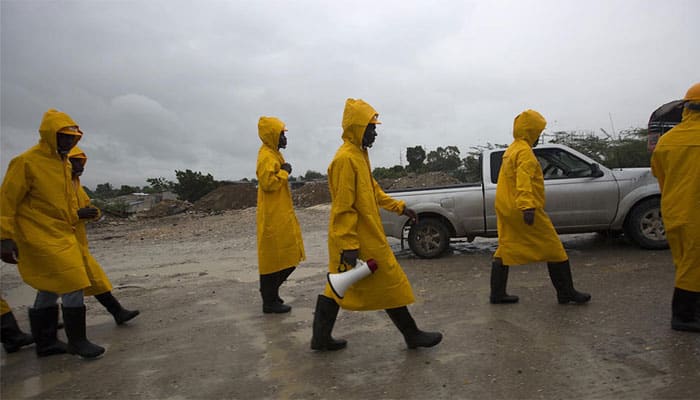District of Columbia: As Hurricane Matthew -- the Caribbean`s worst storm in nearly a decade -- pounds Haiti, aid organizations are bracing for "catastrophic damage" in the impoverished nation`s hardest hit regions.
The United States Agency for International Development has dispatched an elite disaster response team to the poorest nation in the Americas.
In an interview with AFP, Jeremy Konyndyk, who heads USAID`s Office of US Foreign Disaster Assistance, said aid teams are preparing a "massive response."Matthew began battering Haiti late Monday with strong winds and rising sea levels, before barreling ashore some 400 kilometers west of the capital Port-au-Prince, killing three people, unleashing floods and forcing thousands to flee.
Konyndyk said OFDA had its initial response team ready as of Friday, with supplies -- including sanitation necessities and shelter kits -- ready to go in Haiti and Miami, Florida.
"It`s a country that is prone to these kinds of natural disasters," he said. "We have pre-positioned supplies in Haiti at any given time."
Konyndyk said Haitian airports are currently shut down, but ODFA will send more resources as soon as conditions permit.
"This is going to be a very major response for us."The hurricane was forecast to dump 38 to 63 centimeters (15 to 25 inches) of rain over southern Haiti with up to a meter possible in isolated areas.
"We anticipate it will be quite catastrophic," Konyndyk said, with "severe damage to water availability and water infrastructure, which does raise the risk of waterborne diseases."
More than 10,000 people have been killed and 700,000 affected since a cholera outbreak in 2010, with 500 new cases of cholera reported every week.
"The aid that we`ll be providing now will be going to address immediate emergency shelter needs and safe water needs once those areas can be accessed again," Konyndyk said.Southern Haiti has been cut off from the rest of the country after the collapse of a vital bridge linking Port-au-Prince to the southern peninsula.
"The logistic hurdles are going to be immense," Konyndyk acknowledged.
"Roads will be blocked all over -- probably in large swaths of Haiti -- but particularly in the most affected regions in the southwest of the country."
Erosion is especially dangerous in Haiti because of high mountains and a lack of trees and bushes in areas where they have been cut for fuel.
"We`re expecting that landslides will block roads in various place," Konyndyk said. "Debris, road damage, road blockages -- all of that is going to complicate the response."Haiti is home to almost 11 million people, with thousands still living in tents in Haiti after the country`s massive 2010 earthquake.
Farmers in the country`s pummeled south were just about to harvest their staple plantain crop, raising additional concerns about long-term economic impact and a lack of supplies to meet subsistence needs.
"There`s always a risk in this kind of an event that there will be serious disruption to the economy in a more enduring way," Konyndyk said.
He added that USAID was "trying to link our initial disaster relief efforts toward those longer term recovery priorities wherever possible."
















